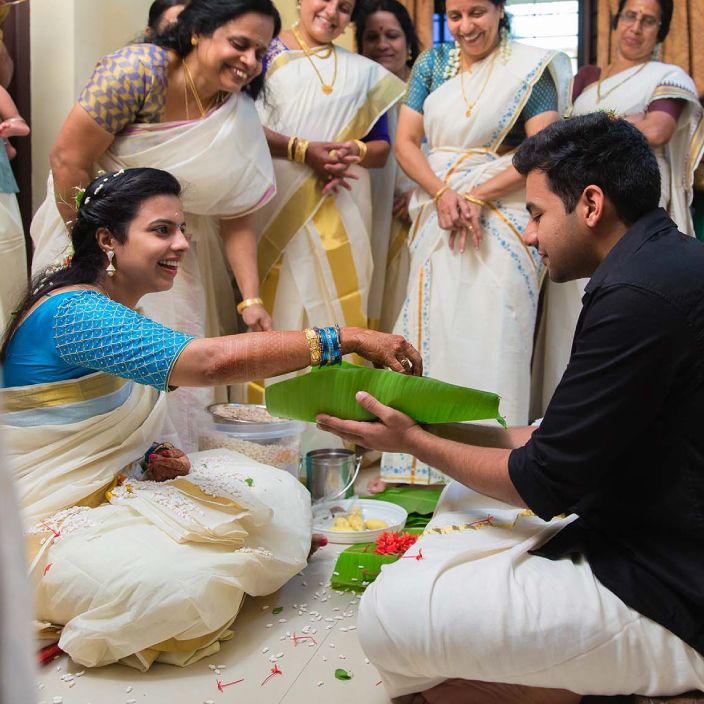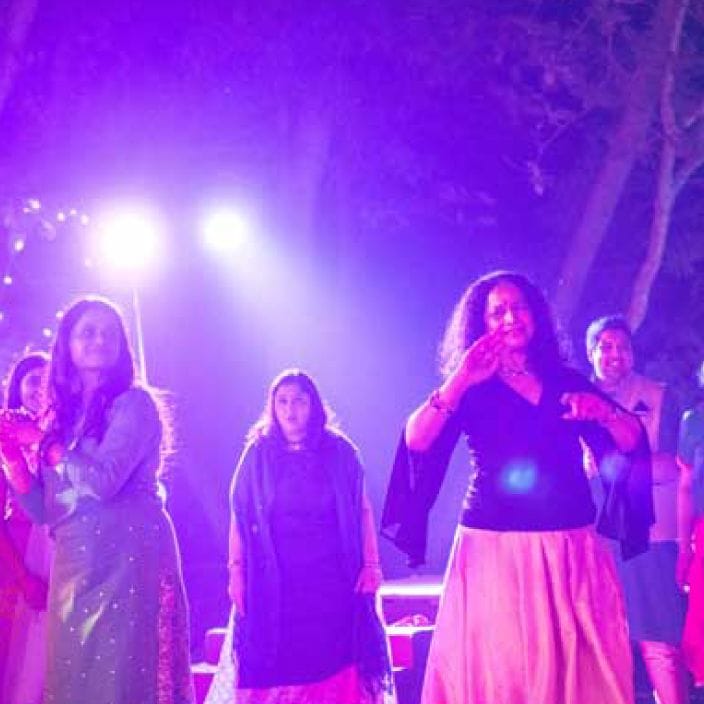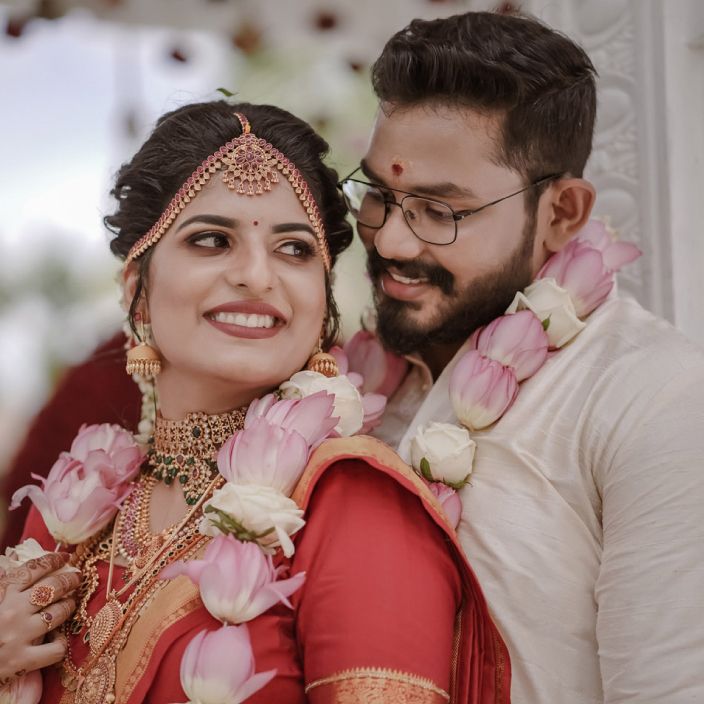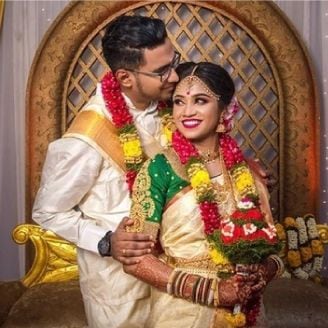For best prices and early deliveries, WhatsApp us at. 918488070070
Kerala
Kerala, often referred to as "God's Own Country," is known for its beautiful nature, rich cultural heritage, and diverse religious practices. Keralan weddings are known for their simplicity. They are elegant and traditional ceremonies conducted with great respect for faith and religion. The rituals reflect the beliefs and spirituality of the Malayali communities.
Tracing the Traditions
Kerala weddings involve a series of rituals held before, during, and after the wedding. The wedding starts with the Muhurtam ceremony, where a priest comes to the family home and studies the couple’s horoscopes. Based on that, he carefully picks an auspicious time for the wedding. Following the Muhurtam is the Nischayam, also known as the engagement ceremony. During Nischayam, the couple exchanges rings, families exchange gifts and jewellery, and elders bless the bride and groom.
Another significant pre-wedding custom is the Traditional Party or Ayinoon, a feast organised by the bride's family. This gathering brings together friends, relatives, and neighbours to celebrate the wedding. The Ayinoon features music, dance, and a delicious spread of Kerala's delights, creating a festive and exciting atmosphere. Another key pre-wedding tradition is the Madhuparkam Ritual, where the bride’s father welcomes the groom, and he gifts a white saree for the bride to wear during the ceremonies.
In a traditional Hindu wedding in Kerala, the ceremony commences with the groom being warmly welcomed by the bride's family and led to the sacred mandap. A significant ritual is the Thalikettu Kalyanam, where the groom lovingly ties a symbolic wedding thread (thali) around the bride's neck, signifying their unity in marriage. The thali, an adornment cherished by the bride for a lifetime, represents her new role as a married woman.
The ceremony of Panigrahanam represents the groom’s acceptance of his bride. Another important custom is Kanyadaanam, where the bride's father entrusts her hand to the groom as a symbol of his faith in him to cherish and support her. This heartfelt gesture marks the bride's transition from her parental home to her new marital life, highlighting strong family ties and mutual responsibilities. During Saptapadi, the couple takes seven ceremonial rounds around the sacred fire together, each step symbolising promises and commitments they make to each other. This tradition signifies their shared journey in life as they vow to uphold their promises and love for one another.
In the Sparsham Ritual, the couple tenderly touches their foreheads together. As a symbolic gesture, the bride throws rice into a veil and then places her foot on a grinding stone called the “ammi.” This shows her acceptance of new marital responsibilities and transition into her new family. The wedding festivities conclude with Sadhya, a traditional lunch served on banana leaves. This elaborate vegetarian feast includes a variety of dishes that represent the community’s hospitality and the joyful celebration of the marriage. Post-wedding traditions include Kudivep, during which the married couple proceeds to the groom’s home. The Grihapravesh ceremony then marks the bride’s entrance into her husband’s household, where she is welcomed by her mother-in-law.
Wedding Attire
Wedding attire in Kerala beautifully blends tradition and elegance, showcasing the region's heritage. The bride’s ensemble combines clothing with stunning jewellery pieces. The Kasavu saree, a cream saree with a border symbolising purity and grace, is paired with a matching blouse for a look of bridal sophistication.
In addition to the Kasavu saree, some brides may choose silk sarees in colours like red, maroon or green embellished with intricate zari work. These sarees are draped in the Kerala style to enhance the bride’s beauty. To complement her attire, the bride wears a gajra—a string of jasmine flowers—in her hair for an extra touch of charm.
Jewellery and accessories play a role in enhancing the bridal ensemble during Kerala weddings. The bride’s jewellery is both intricate and culturally significant. Temple jewellery inspired by temple sculptures is particularly popular, featuring necklaces, earrings, bangles, and rings crafted from gold and adorned with gemstones.
One standout piece of jewellery is the Kasumala—a necklace made of gold coins symbolising wealth and prosperity. Another notable piece is the Elakkathali, a collar necklace adorned with delicate leaflets that sway with movement, catching light in a captivating way to create a sparkling effect. Another essential accessory is the Palakka Mothiram ring embellished with precious stones. Jhumkis—earrings that complement the necklace and other jewellery pieces—are also worn by the bride. An Oddiyanam, a gold waist belt worn over the saree enhances the bride’s overall look.
For the groom, it is customary to wear a Mundu, a white dhoti with a gold zari border, and a Melmundu draped over the shoulder. Occasionally, the groom may opt for a kurta or silk shirt to complement the Mundu, elevating his overall appearance. This attire exudes simplicity and sophistication, reflecting Kerala’s traditional clothing style. Some grooms may opt for kurta pyjamas or sherwanis for the reception, which adds a touch of elegance by accessorising with gold rings and bracelets.
Women attending the wedding as guests typically choose sarees or salwar kameez, while men opt for Mundus, dhotis or formal suits. It is common to see people wearing gold chains and necklaces with pendants at Kerala weddings.
Traditional Cuisine
Kerala weddings are renowned for their spreads, which highlight the region's culinary legacy. The Sadhya feast, served on banana leaves, steals the spotlight at these events. Upon arrival, guests are treated to an array of appetisers that set the stage for the ensuing meal. From crispy delights like banana chips to treats such as Elayappam, Kappa, Achappam (cookies) and Murukku, these snacks create an inviting ambience at the festivities.
The main attraction of the feast consists of Sadhya’s vegetarian delicacies served on banana leaves each dish carefully prepared to highlight the taste of Kerala cuisine. The meal features rice accompanied by a variety of curries and side dishes. A popular dish is Puttu with kadala curry, which consists of rice cakes served with chickpea curry. Standout dishes include Sambar, a lentil-based curry; parippu, a lentil dish; and Avial, a mixed vegetable curry rich in coconut. In addition to these, non-vegetarian options like fish curry, Chicken Curry, chicken roast, and mutton biryani are also popular. Traditional favourites like Thoran, a coconut-infused stir fry; Olan, a creamy ash gourd curry with coconut milk; and Kaalan, a yoghurt-based curry with plantains or yams, beautifully represent the flavours of Kerala cuisine.
Desserts play a role in Sadhya meals, with Payasam stealing the show. This classic Kerala sweet treat, prepared with milk, rice or vermicelli and flavoured with cardamom, cashews, and raisins, comes in forms like Palada Payasam and Ada Pradhaman to wrap up the meal on a note. These desserts not only please the taste buds but also reflect the roots and traditional tastes of Kerala.
To balance out the flavours of Sadhya dishes, traditional beverages are served to keep guests refreshed. Sambharam, a buttermilk drink, offers a cooling effect, and tender coconut water provides hydration and subtle sweetness, perfectly complementing the array of flavours in this grand feast.
Cultural Decor
The traditional decorations seen at weddings in Kerala are a delight for the senses, reflecting the area’s history and natural charm. The decor is known for its simplicity and use of elements, creating an atmosphere that is both peaceful and majestic.
A key feature of Kerala wedding decor is the garlands known as thoranams. These garlands, crafted from flowers like jasmine, marigold and roses, are strung together to embellish doorways, wedding stages (mandaps) and other important areas of the venue. The scent of these flowers fills the air enhancing the appeal with an added experience.
Another common element in Kerala wedding decorations is the use of banana leaves. These leaves often serve as runners or mats on tables, providing a backdrop for pieces. In customs, banana leaves are also used to create wall art and other ornamental items, highlighting the versatility and cultural significance of this natural material.
Kerala's rich heritage of arts and crafts plays a role in shaping wedding decor in the region.
Kathakali masks and Theyyam motifs, which symbolise age-old dance forms, are sometimes employed to adorn the wedding venue, infusing it with a sense of legacy and creative elegance. Crafted by artisans, these masks and motifs are colourful and intricately designed, embodying the essence of Kerala’s artistic customs.
The inclusion of brass lamps, also known as nilavilakku, is a feature of Kerala wedding decorations. These lamps are lit during the ceremony to invoke blessings from above and establish an ambience. The gentle illumination from the lamps, the fragrance of flowers, and the melodies of music set forth a spiritual and tranquil atmosphere.
Moreover, Coir products play a role in decorating Kerala wedding settings. Coir, derived from coconut husks, is an eco material woven into mats, carpets, and various decorative pieces. These items contribute an allure to the decor while showcasing Kerala's age-old craftsmanship. Coir mats often serve as floor coverings or seating accents, introducing a grounding element to the wedding arrangement.
Although traditional decor elements hold their charm, contemporary touches are increasingly integrated into modern-day Kerala weddings to fuse tradition with innovation. Twinkling fairy lights and glowing LED lanterns are commonly used to brighten up the venue, adding a touch of magic to the evening festivities. These lights are often hung around the mandap or placed along pathways, creating a captivating ambience.
Flowing drapes and rich fabrics in hues like gold, white, and red are widely employed to adorn the wedding space. These drapes are usually crafted from silk or cotton with patterns and motifs. They are also used to craft canopies, backdrops, and other ornamental features that bring an air of grace and refinement to the wedding decorations.
Integrating handicrafts into wedding embellishments is a way of paying homage to Kerala’s cultural legacy. Pookalam, or floral rangoli art, involves fashioned elaborate designs on floors using flower petals. These designs are commonly placed at the wedding venue’s entrance or around the mandap, greeting guests with their colours and detailed patterns.
Artistic murals portraying mythological scenes and natural landscapes also serve as elements. These murals, skillfully painted by artists, infuse a historical significance into the wedding decor. They can serve as backdrops for the mandap or as accents throughout the venue.



